Let’s talk about how legalized gambling can breathe new life into struggling communities. You might be surprised to learn just how much of an economic punch these establishments can pack. While some folks raise eyebrows at the idea of casinos moving into their neighborhoods, there’s no denying the financial boost they bring to local economies.
Think about it this way: when a casino opens its doors, it’s like dropping a stone in a pond. The ripples spread far beyond the gaming tables and slot machines. First, you’ve got the obvious benefits, like the tax revenue that fills city coffers and helps fund local projects. Then there’s the job creation, and we’re not just talking about dealers and security staff. Local restaurants, hotels, and shops all get a piece of the action.
But here’s where it gets interesting. The economic impact goes even deeper than what meets the eye. Construction companies get busy building new facilities, local suppliers start getting bigger orders, and suddenly there’s more money flowing through the community. Real estate values often climb, and other businesses start popping up to serve the increased traffic.
Sure, we need to have honest conversations about the social aspects of gambling. But when you look at the numbers and see how these establishments can transform struggling areas, it’s worth taking a closer look at the whole picture. After all, many communities have found that responsible gaming operations can be just the economic spark they needed to turn things around.
Tax Revenue Generation
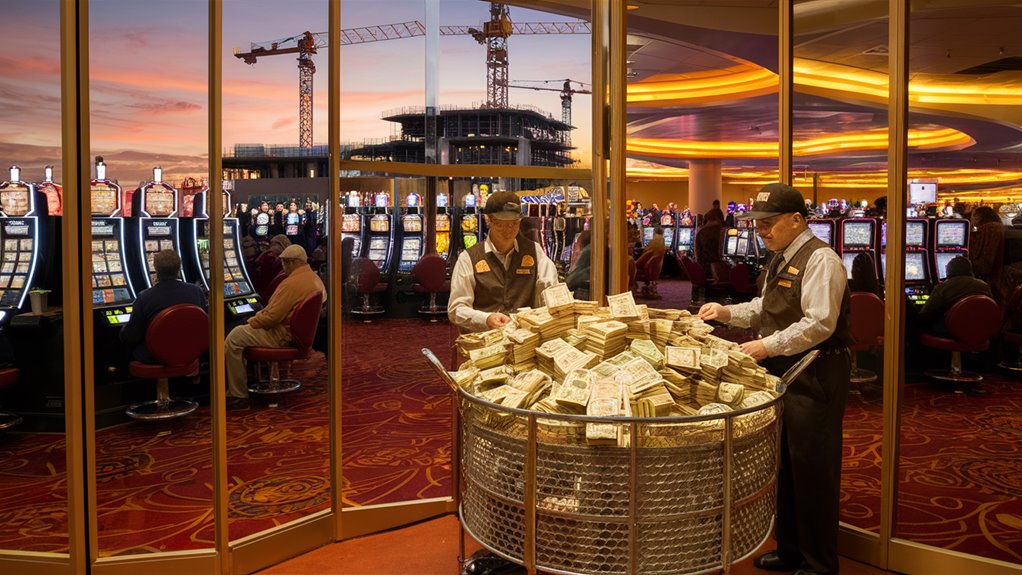
Let’s talk about how gambling puts money back into our communities through taxes. You might be surprised to learn just how much revenue states generate when they legalize gambling activities. Think of it as a win-win situation, where people enjoy their games while contributing to public services we all use.
The numbers tell an interesting story. States that have given gambling the green light are seeing their coffers grow substantially. What makes this particularly attractive is the tax rate structure – gambling establishments typically hand over a much bigger slice of their earnings than your average business. We’re talking about rates that can go up to 40% or even higher of their total gaming income. Just imagine, for every $100 someone spends at a casino, up to $40 could end up funding public services.
Take successful gambling states like Nevada or New Jersey. These places have turned gaming into a reliable source of public funding, collecting billions over time. But what’s really interesting is how the benefits spread beyond just the gaming floor.
Hotels pop up, restaurants open their doors, and entertainment venues spring to life around gambling establishments. Each of these businesses generates its own stream of taxes – property taxes, employment taxes, sales taxes, you name it. It’s like dropping a stone in a pond – the ripples keep spreading outward, creating more and more opportunities for tax revenue that supports everything from our kids’ schools to the roads we drive on.
Think about your local community. When a gambling facility opens up, it’s not just about the games inside. It creates a whole ecosystem of taxable activities that can provide steady funding for public projects and services we rely on every day.
Job Creation and Employment
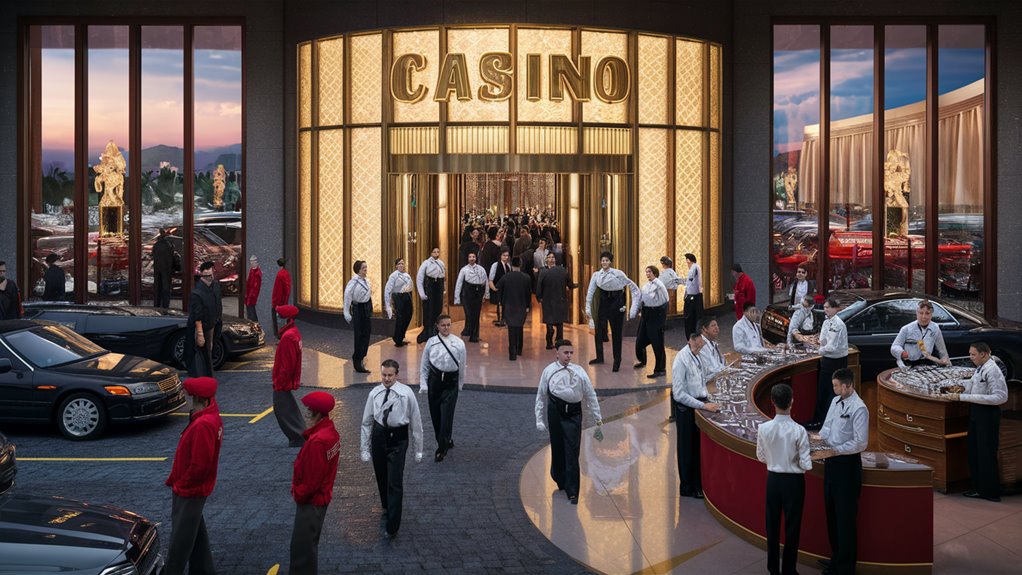
Let’s talk about how gambling creates jobs across our economy. You might be surprised by just how many different careers spring up around this industry. Think about it: casinos and racetracks need way more than just dealers and security guards. They’re actually like small cities, employing everyone from hospitality staff to IT experts, accountants, and marketing pros.
But here’s the really interesting part – gambling venues create this amazing ripple effect in local communities. Picture a new casino opening up in town. Suddenly, nearby restaurants need more servers, hotels hire extra housekeepers, and local taxi services add drivers to handle all those visitors. It’s like dropping a stone in a pond and watching the waves spread outward.
The digital gambling world is booming too, and it’s not just about betting apps. These platforms need tech wizards to keep things running smoothly, customer service teams to help players 24/7, and compliance experts to make sure everything stays above board.
And let’s not forget about all the behind-the-scenes jobs – from the folks who manufacture slot machines to the financial experts handling transactions.
What’s really cool is how one gambling facility can transform an entire area’s job market. Construction crews stay busy with renovations and expansions, security companies beef up their teams, and even local shops need more staff to handle increased foot traffic.
Plus, with regulations being so important in this industry, there’s growing demand for people who can monitor compliance and support responsible gambling programs.
Think of the gambling industry like a big economic engine that keeps creating new opportunities in places you mightn’t expect. Whether you’re a software developer, marketing specialist, or hospitality pro, there’s probably a role that fits your skills in this expanding field.
Tourism and Local Business Growth
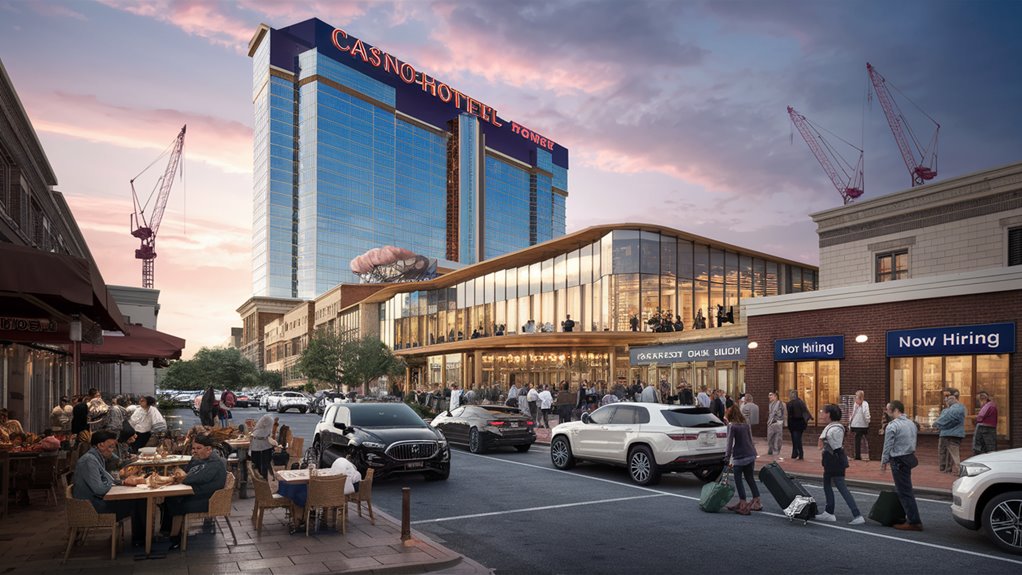
Let’s talk about how gambling destinations really shake things up for local tourism and businesses. You know how some places just have that special buzz about them? That’s exactly what happens when a gambling destination takes root in a community.
Think about it – these spots become like magnets for visitors, and not just any visitors. We’re talking about folks who tend to stick around longer and aren’t shy about opening their wallets. The really interesting part? They spread their money around way beyond the casino floor. Picture someone who came to try their luck at the tables, but ends up having dinner at that family-owned Italian place downtown, browsing through local boutiques, and booking a few extra nights at a nearby hotel.
What’s really cool is how these gambling spots evolve into complete entertainment hubs. You’ll find everything from Broadway-style shows to trendy nightclubs, massive convention spaces, and high-end shopping centers all under one roof. It’s like a domino effect, really. What started as a simple gambling trip turns into a full-blown vacation experience, with visitors finding new ways to enjoy themselves and, naturally, spend their money.
Local businesses have gotten pretty smart about riding this wave. That corner café might start staying open late to catch the after-hours crowd, while hotels in the area upgrade their rooms to match visitors’ expectations.
And here’s something neat – even businesses that have nothing to do with gambling get a piece of the action. From taxi services running extra shifts to gift shops stocking up on local souvenirs, everyone finds a way to tap into this growing market. It’s amazing how one big attraction can create so many opportunities for both existing businesses and newcomers looking to make their mark.
Infrastructure Development and Investment
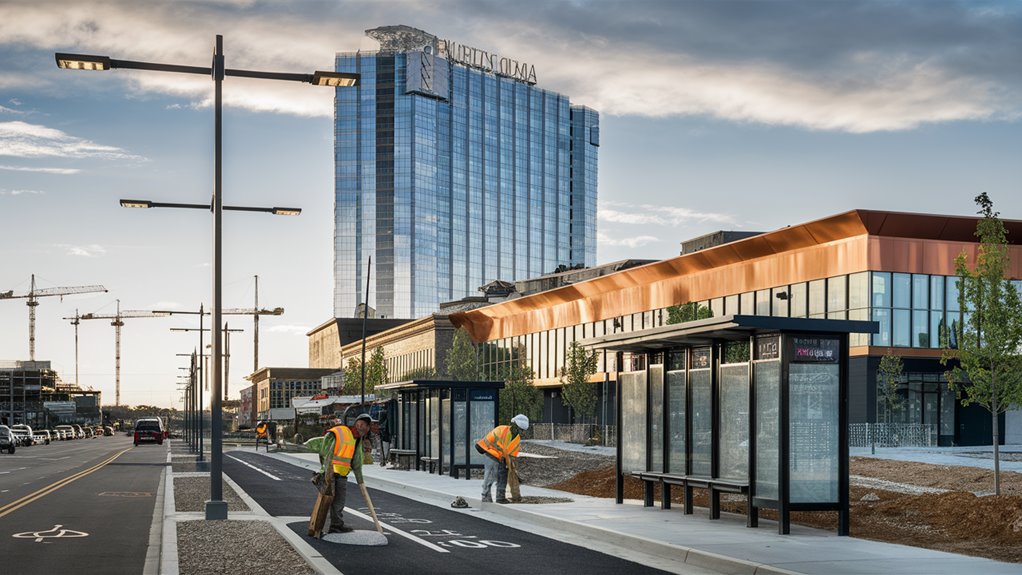
Let’s talk about how gambling transforms local infrastructure – it’s pretty fascinating when you think about it. You know how tourism and business growth can reshape a city? Well, when casinos come to town, they kick off some serious improvements that benefit everyone, not just gamblers.
Picture this: a new casino opens up, and suddenly there’s a push to upgrade everything from roads to bridges. The interesting part? These aren’t just fancy driveways to the casino – we’re talking about whole networks of improved streets and better public transport that locals use every day.
Casino money does some heavy lifting for public projects too. Cities get to use those gambling taxes for essential upgrades that might otherwise take years to fund. Think modern power grids, better water systems, and faster internet. You’ll often spot new parking structures popping up, along with nicer sidewalks and brighter street lighting all around town.
But here’s what really gets interesting – these improvements are like a magnet for other businesses. Once the basic infrastructure gets better, private developers start showing up with plans for new hotels, restaurants, and shops. It’s kind of like a snowball effect, you know? The initial casino-driven improvements convince other businesses that this is a place worth investing in.
And there’s another cool bonus: when cities show they can handle big infrastructure projects like these, they often become more attractive candidates for state and federal grants. It’s like proving you can handle responsibility – suddenly more opportunities open up for even bigger improvements down the road.
Community Development Through Reinvestment
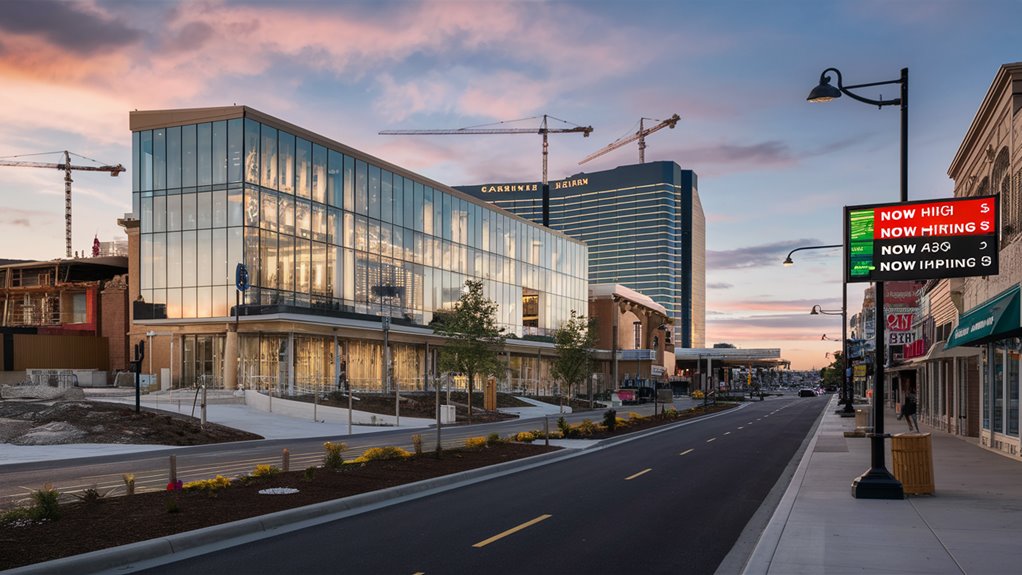
Let’s talk about how casinos can actually be a force for good in communities through smart reinvestment programs. You know how people often focus on the gambling side of things? Well, there’s actually a pretty interesting story about how these revenues flow back into local development.
Here’s the thing – licensed casinos are typically required to put a good chunk of their profits right back into the community. Think of it as a cycle: money comes in from gaming, and a portion goes straight into making the neighborhood better.
What does this look like in real life? Picture a small town that suddenly has funds for new after-school programs, or a community center that badly needed renovation. These aren’t just quick fixes either.
Many casinos help fund everything from job training programs to small business grants, giving locals real opportunities to build better lives.
It’s pretty remarkable when you look at the public services too. Instead of raising taxes on residents, communities can tap into casino revenues to upgrade their emergency services, fix roads, or maintain local parks.
Take tribal gaming communities, for instance – many have completely transformed their healthcare systems and built amazing cultural centers using these funds.
The cool thing is, this isn’t just about making the casino more money. When done right, these reinvestment programs create a ripple effect throughout the whole community.
Local businesses thrive, new jobs pop up, and suddenly you’ve got this sustainable economic ecosystem that keeps growing and benefiting everyone involved.
Economic Impact on Regional Markets
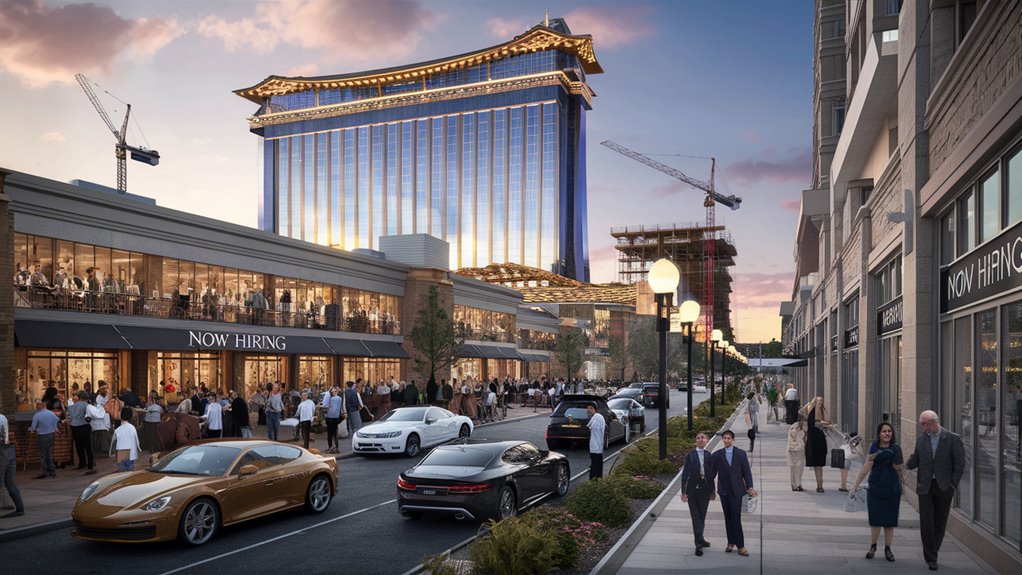
Let’s talk about what really happens when casinos come to town. You know how one big change can create a ripple effect? That’s exactly what happens in regional markets when casinos set up shop. Think of it like dropping a stone in a pond – the impact spreads far beyond the initial splash.
Local businesses often get a pleasant surprise. Restaurants that used to have quiet weeknights suddenly find themselves booking extra staff, while hotels that once struggled during off-seasons start seeing year-round visitors.
In fact, many nearby businesses report their income jumping by 20-30% in just the first year. Pretty impressive, right?
The money just keeps moving around the community, kind of like a game of economic hot potato. Casino visitors grab lunch at local diners, shop at nearby stores, and maybe catch a show at the community theater. This means more tax dollars flowing into city coffers, even in towns that don’t have casinos themselves.
And here’s something interesting: homeowners often see their property values climb, especially if they’re near successful gaming venues.
But it’s not just about the casino jobs themselves. Picture this: more taxi drivers are needed to transport visitors, security companies hire additional staff, and local cleaning services expand their teams.
Even small businesses get a piece of the action, with local bakeries supplying pastries to casino cafes or print shops handling promotional materials.
Looking at the numbers, most areas see their overall economic activity bump up by 15-25% within a 50-mile radius. That’s what we call a win-win for everyone in the community.
Common Questions
How Does Legalized Gambling Affect Property Values in Surrounding Neighborhoods?
Let’s talk about the interesting relationship between casinos and local property values. You might be surprised to learn that it’s not a simple yes-or-no situation. When a casino comes to town, it often brings a wave of positive changes, like new restaurants, improved roads, and fancy hotels. These amenities typically give nearby property values a nice boost.
But here’s the catch. While many neighborhoods see their home values climb thanks to casino development, there’s another side to consider. Sometimes, areas around casinos face challenges like increased traffic, noise, or social issues related to problem gambling. In these cases, property values might actually take a hit.
Think of it like having a major shopping mall move into your area. On one hand, you get convenience and new amenities that make the neighborhood more desirable. On the other hand, you might have to deal with more traffic and occasional late-night activity. The same principle applies to casinos and their impact on local real estate.
The key factor often comes down to how well the casino and local community work together. When there’s good planning, strong security, and community investment, property values tend to rise. But without proper management and oversight, the opposite can happen.
What Percentage of Gambling Revenue Comes From Local Residents Versus Tourists?
You might be surprised to learn how gambling revenue breaks down between locals and tourists. In most places, it’s actually the local residents who make up the bulk of casino earnings, typically accounting for 50-80% of all gambling revenue. This makes sense when you think about it, since locals can visit casinos regularly throughout the year.
But then there’s Las Vegas, which flips this pattern completely. The Strip’s glittering casinos pull in about 85% of their gambling money from tourists who’ve come specifically to experience Sin City’s famous entertainment. It’s a unique case where out-of-towners dramatically outspend the local population at the gaming tables.
Think of it like your neighborhood restaurant versus a famous tourist spot. Your local diner probably sees the same familiar faces day after day, while a place like Times Square in New York mainly serves visitors. The same principle applies to casinos, with most venues relying on their regular local customers, except for those rare destination gambling hubs that become tourist magnets.
Do Gambling Establishments Contribute to Increased Crime Rates in Communities?
Let’s talk about how casinos affect crime in our communities. You might think crime only happens inside gambling establishments, but the reality is a bit more complex. The real story often unfolds in the neighborhoods and areas surrounding these venues.
Research shows that when casinos come to town, certain types of crime tend to go up. Think about it – where there’s a concentration of cash and late-night activity, you’ll likely see more opportunities for theft. We’re not just talking about pickpockets or burglaries, though. The impact ripples out into the surrounding streets with increased DUIs as people head home after drinking, and various forms of fraud as some desperate gamblers look for ways to cover their losses.
But here’s something interesting – the casino floor itself is usually one of the safest places around. With top-notch security systems, cameras everywhere, and trained staff keeping watch, most criminals tend to look elsewhere for easier targets. It’s usually the parking lots, nearby streets, and surrounding neighborhoods that bear the brunt of increased criminal activity.
Like any community issue, the relationship between gambling venues and crime isn’t black and white. Each situation depends on factors like location, security measures, and how well local law enforcement adapts to these new challenges in their area.
How Do Casinos Impact Existing Local Entertainment Businesses?
Let’s talk about how casinos affect local entertainment spots – it’s quite interesting when you think about it. Picture your typical Friday night in a small town, where people used to spread their entertainment budget across different venues. When a casino moves in, things tend to shift pretty dramatically.
Local businesses often feel the squeeze when a casino opens its doors nearby. You know those family-owned restaurants that have been around forever? Or that charming theater showing indie films? Well, they suddenly find themselves competing with a entertainment powerhouse that offers everything under one roof. It’s like having a big-box store move in next to small retail shops.
The impact can be pretty substantial. Many people who might have spent $50 on dinner and drinks at a local spot might now take that same money to try their luck at the slots, grab a meal at the casino buffet, and catch a show there too. Small venues that once had regular weekend crowds may notice their tables getting emptier, while local bars might see their loyal customers drifting toward the casino’s lounges instead.
Of course, some clever business owners manage to adapt by finding their own unique niches or even partnering with the casino. But for others, especially those operating on thin margins, the competition can be too tough to handle, leading them to either scale back or, unfortunately, close their doors completely.
What Measures Protect Communities From Potential Gambling Addiction Problems?
Let’s talk about protecting our communities from gambling-related problems. You know how it goes – when it comes to responsible gambling, there’s actually quite a robust safety net in place.
First up, betting limits are a real game-changer. Think of them like a spending cap on your credit card – they help you stay within reasonable bounds. Most casinos and online platforms let you set your own limits, so you’re in control of your spending from the get-start.
Then there’s the self-exclusion system, which is pretty clever when you think about it. It’s like putting yourself on a “do not serve” list – once you’re on it, 사이트 먹튀 이력 확인하기 casinos have to turn you away. This can be a real lifeline for folks who need a break from gambling.
You’ll also notice those addiction warnings everywhere, kind of like the health warnings on cigarette packs. And if things ever feel overwhelming, there’s always someone to talk to – those 24/7 helplines are staffed by professionals who really get it.
Local regulations play their part too. They control when casinos can open and how they can advertise, just like we have rules about when bars can serve alcohol. Plus, there are counseling services right in your community, ready to offer support when needed.
The best part? All these measures work together, creating multiple layers of protection. It’s like having both a seatbelt and airbags in your car – you’re covered from different angles.